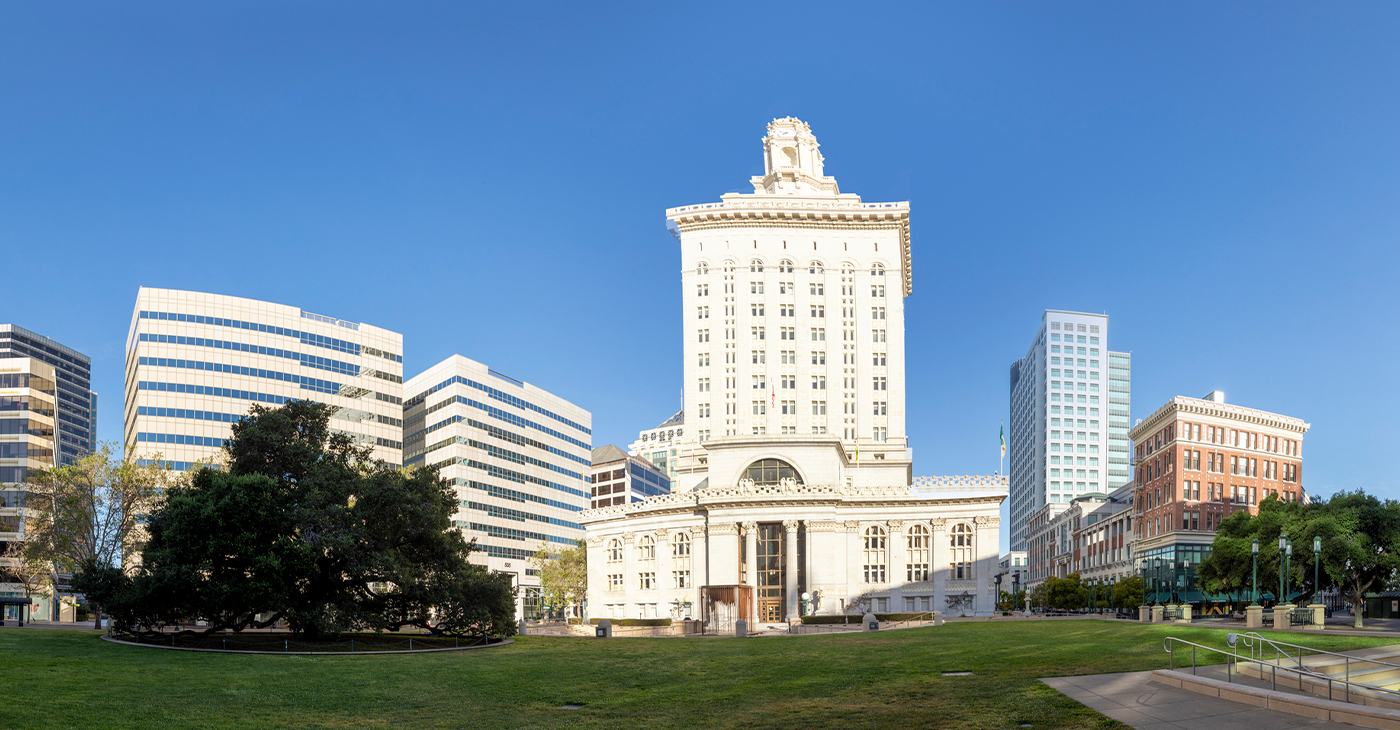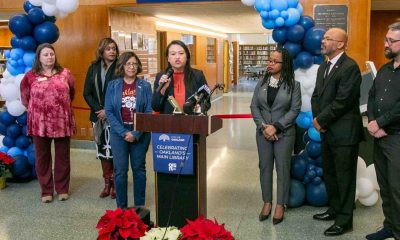Bay Area
S.F. Mayor Announces Expansion of Treatment Beds for People Suffering from Mental Health, Substance Use Disorders
As part of the Breed’s budget investments, San Francisco will create over 400 new treatment beds, a 20% expansion

Mayor London N. Breed and the San Francisco Department of Public Health (DPH) announced on July 21 that San Francisco is implementing the expansion of over 400 new treatment beds for people experiencing mental health and substance use issues. This expansion of treatment beds will provide more options for people in need to receive appropriate services that match their situation, while also providing San Francisco’s new Street Response Teams with additional placements for clients they interact with.
The expansion plans represent a 20% increase in the City’s residential treatment capacity. In 2021 alone, San Francisco will see 140 new beds opened, with significant progress made toward filling the gaps in critical needs areas identified in the 2020 Behavioral Health Bed Optimization Report. Since Breed took office, San Francisco has added more than 100 treatment beds across San Francisco’s system of care.
“This is an unprecedented expansion of our system of care and treatment for people with mental health and substance use disorders,” said Breed. “We are responding with the urgency that this crisis deserves, while saving millions of dollars by removing bottlenecks in the system so that people can move into lower, less costly levels of care when they are ready. Each one of these placement facilities takes a tremendous amount of time and effort to make happen, but we should see the benefits for years to come.”
These new treatment beds will allow San Francisco’s new street outreach teams, including the Street Crisis Response Teams and the Street Wellness Response Teams, with additional placements that can serve the clients they interact with.
There are now five Street Crisis Response Teams operating in San Francisco, responding to about 500 calls monthly. Breed included funding in this year’s budget for five Street Wellness Response Teams, which will begin to respond to “wellness check” calls, which total roughly 17,000 annually.
The expansion effort is guided by recommendations from the Behavioral Health Bed Optimization Project report in 2020, as well as the Mental Health SF legislation in 2019, and utilization data that identified the types of treatment in highest need. These new beds and facilities are at various stages of development, with some ready for opening in 2021 and others in stages of planning and design.
“Coming out of COVID, our biggest public health crisis is the thousands of people living on our streets with untreated mental health and substance use disorders. Getting these sick people off the streets and into appropriate treatment beds will save lives and make San Francisco a safer and healthier place for all,” said District 8 Supervisor Rafael Mandelman.
“People who are mentally ill and addicted to drugs need immediate access to treatment and care. Expanding our city’s treatment beds and Street Crisis Response teams through Mental Health SF will better ensure services are available, accessible and effective,” said District 6 Supervisor Matt Haney. “Fully funding Mental Health SF was a top priority for us during this year’s budget process, and we worked together to expand much needed treatment beds, care coordination, and street intervention. These treatment beds cannot come soon enough.”
“This expansion of available treatment facilities is an essential part of fully implementing Mental Health SF. We must have places for people in crisis to get the care they desperately need and to stop the revolving door that returns people to the streets,” said District 9 Supervisor Hillary Ronen.
“We are not only improving patient flow so that individuals receive timely care and treatment, we are also developing innovative models of care to target the unique needs we see in the community,” said Dr. Naveena Bobba, Deputy Director of Health. “The investments we are making in the expansion in our residential care and treatment system will be critical to help us meet our goal for rapid access to recovery-oriented care and treatment.”
Several innovative types of treatment and care programs designed to meet the diverse needs of people with behavioral health challenges are being developed, including:
- The 20-bed SOMA RISE Center will open in the fall of 2021 as part of the City’s response to the drug overdose crisis. It will offer a safe indoor space for people who have used methamphetamine or other substances, monitor their health while intoxicated, and connecting them with other health and social services.
- A 10-bed residential treatment facility specifically designed to treat young adults with serious mental health and/or substance use disorders is under design.
- Neighborhood-based psychiatric respite facilities for people experiencing homelessness to shelter in a safe, supportive environment where they can also access ongoing care.
Meanwhile, as board-and-care homes shutter due to the escalating costs of housing, DPH is also in active negotiations to acquire facilities to accommodate at least 73 residential care beds to support people with mental health issues who require assistance with activities of daily living. Some of these will support the elderly.
Critically, DPH is also creating 140 new beds to support people leaving residential substance use treatment – a last step in skill-building before independent housing.
In May, DPH alongside community partners PRC/Baker Places, the Salvation Army, and Tipping Point Community opened Hummingbird Valencia, a psychiatric respite facility for people experiencing homelessness in the Mission and Castro neighborhoods. It is now operating at full capacity with 30 overnight beds and 20 daytime drop-in spaces.
For the latest update on San Francisco’s residential care and treatment expansion, go to: sf.gov/residential-care-and-treatment.
San Francisco has also made available a daily update of available mental health and substance use treatment beds at: FindTreatmentSF.org.
The San Francisco Mayor’s Office of Communications is the source of this story.
Bay Area
Glydways Breaking Ground on 14-Acre Demonstration Facility at Hilltop Mall
Glydways has been testing its technology at CCTA’s GoMentum Station in Concord for several years. The company plans to install an ambitious 28-mile Autonomous Transit Network in East Contra Costa County. The new Richmond facility will be strategically positioned near that project, according to Glydways.

The Richmond Standard
Glydways, developer of microtransit systems using autonomous, small-scale vehicles, is breaking ground on a 14-acre Development and Demonstration Facility at the former Hilltop Mall property in Richmond, the Contra Costa Transportation Authority (CCTA) reported on social media.
Glydways, which released a statement announcing the project Monday, is using the site while the mall property undergoes a larger redevelopment.
“In the interim, Glydways will use a portion of the property to showcase its technology and conduct safety and reliability testing,” the company said.
Glydways has been testing its technology at CCTA’s GoMentum Station in Concord for several years. The company plans to install an ambitious 28-mile Autonomous Transit Network in East Contra Costa County. The new Richmond facility will be strategically positioned near that project, according to Glydways.
The new Richmond development hub will include “over a mile of dedicated test track, enabling Glydways to refine its solutions in a controlled environment while simulating real-world conditions,” the company said.
Visitors to the facility will be able to experience on-demand travel, explore the control center and visit a showroom featuring virtual reality demonstrations of Glydways projects worldwide.
The hub will also house a 13,000-square-foot maintenance and storage facility to service the growing fleet of Glydcars.
“With this new facility [at the former Hilltop Mall property], we’re giving the public a glimpse of the future, where people can experience ultra-quiet, on-demand transit—just like hailing a rideshare, but with the reliability and affordability of public transit,” said Tim Haile, executive director of CCTA.
Janet Galvez, vice president and investment officer at Prologis, owner of the Hilltop Mall property, said her company is “thrilled” to provide space for Glydways and is continuing to work with the city on future redevelopment plans for the broader mall property.
Richmond City Manager Shasa Curl added that Glydways’ presence “will not only help test new transit solutions but also activate the former Mall site while preparation and finalization of the Hilltop Horizon Specific Plan is underway.
Alameda County
Last City Council Meeting of the Year Ends on Sour Note with Big Budget Cuts
In a five to one vote, with Councilmembers Carroll Fife and Janani Ramachandran excused, the council passed a plan aimed at balancing the $130 million deficit the city is facing. Noel Gallo voted against the plan, previously citing concerns over public safety cuts, while Nikki Fortunato-Bas, Treva Reid, Rebecca Kaplan, Kevin Jenkins, and Dan Kalb voted in agreement with the plan.

By Magaly Muñoz
In the last lengthy Tuesday meeting of the Oakland City Council for 2024, residents expressed strong opposition to the much needed budget cuts before a change in leadership was finalized with the certification of election results.
In a five to one vote, with Councilmembers Carroll Fife and Janani Ramachandran excused, the council passed a plan aimed at balancing the $130 million deficit the city is facing. Noel Gallo voted against the plan, previously citing concerns over public safety cuts, while Nikki Fortunato-Bas, Treva Reid, Rebecca Kaplan, Kevin Jenkins, and Dan Kalb voted in agreement with the plan.
Oakland police and fire departments, the ambassador program, and city arts and culture will all see significant cuts over the course of two phases.
Phase 1 will eliminate two police academies, brown out two fire stations, eliminate the ambassador program, and reduce police overtime by nearly $25 million. These, with several other cuts across departments, aim to save the city $60 million. In addition, the council simultaneously approved to transfer restricted funds into its general purpose fund, amounting to over $40 million.
Phase 2 includes additional fire station brownouts and the elimination of 91 jobs, aiming to recover almost $16 million in order to balance the rest of the budget.
Several organizations and residents spoke out at the meeting in hopes of swaying the council to not make cuts to their programs.
East Oakland Senior Center volunteers and members, and homeless advocates, filled the plaza just outside of City Hall with rallies to show their disapproval of the new budget plan. Senior residents told the council to “remember that you’ll get old too” and that disturbing their resources will only bring problems for an already struggling community.
While city staff announced that there would not be complete cuts to senior center facilities, there would be significant reductions to staff and possibly inter-program services down the line.
Exiting council member and interim mayor Bas told the public that she is still hopeful that the one-time $125 million Coliseum sale deal will proceed in the near future so that the city would not have to continue with drastic cuts. The deal was intended to save the city for fiscal year 2024-25, but a hold up at the county level has paused any progress and therefore millions of dollars in funds Oakland desperately needs.
The Coliseum sale has been a contentious one. Residents and city leaders were originally against using the deal as a way to balance the budget, citing doubts about the sellers, the African American Sports and Entertainment Group’s (AASEG), ability to complete the deal. Council members Reid, Ramachandran, and Gallo have called several emergency meetings to understand where the first installments of the sale are, with little to no answers.
Bas added that as the new Alameda County Supervisor for D5, a position she starts in a few weeks, she will do everything in her power to push the Coliseum sale along.
The city is also considering a sales tax measure to put on the special election ballot on April 15, 2025, which will also serve as an election to fill the now vacant D2 and mayor positions. The tax increase would raise approximately $29 million annually for Oakland, allowing the city to gain much-needed revenue for the next two-year budget.
The council will discuss the possible sales tax measure on January 9.
Activism
Living His Legacy: The Late Oscar Wright’s “Village” Vows to Inherit Activist’s Commitment to Education
Kingmakers of Oakland (KOO), a nonprofit organization that works to improve educational and life outcomes for Black boys and men, stated that “Oscar Wright is one of the most prolific, consistent, and committed advocates of equity for Black students and Black Families here in Oakland for the past six decades.”

By Antonio Ray Harvey, California Black Media
Activists mourning Oscar Carl Wright’s death, have pledged to continue his lifelong mission of advocating for Black students and families in Northern California.
Wright, 101, who passed away on Nov. 18, was involved in Oakland’s educational affairs until his death.
Now, friends and admirers acknowledge that carrying on his legacy means doubling down on the unfinished work that Wright dedicated his life, time, and resources to, according to Y’Anad Burrell, a family friend and founder of San Francisco-based Glass House Communications (GHC).
“Mr. Wright did a lot of work around equity, specifically, for Black students based on their needs — whether it was tutoring, passing classes, or graduating,” Burrell said.
Wright became a champion for his children’s education, recognizing the disparities between their school experiences and his own upbringing in the Mississippi Delta.
Burrell told California Black Media (CBM) that the crisis of unequal access to resources and a quality education continues to affect the Oakland Unified School District (OUSD).
According to Oakland Reach, in the city of Oakland, only 3 in 10 Black and Brown students are reading at or above grade level. In addition, only 1 in 10 are doing math at or above grade level.
Oakland REACH is a parent-run, parent-led organization. It aims to empowers families from the most underserved communities to demand high-quality schools for their children.
Wright’s work as an activist had impact across the state but he was primarily known in the Bay Area. Alongside the Black United Front for Educational Reform (BUFER), he filed a complaint against OUSD for violating the Civil Rights Act of 1964.
In 2000, the OUSD school board proposed an action plan to address educational inequity, but it was never implemented.
Wright later founded the African American Honor Roll Celebration at Acts Full Gospel Church, an award that recognizes Black students with a grade point average of 3.0 or better. Each year, more than 1,000 students are honored at this ceremony.
Kingmakers of Oakland (KOO), a nonprofit organization that works to improve educational and life outcomes for Black boys and men, stated that “Oscar Wright is one of the most prolific, consistent, and committed advocates of equity for Black students and Black Families here in Oakland for the past six decades.”
Burrell said that one of the main reasons Wright’s work was so essential for families and children in Oakland that is the direct relationship between acquiring a quality education and affording quality housing, maintaining food security, achieving mental wellness, and securing stable employment.
Wright was the child of sharecroppers from Coahoma County, Mississippi. He attended Alcorn State University, a Historically Black College and University (HBCU).
In the late 1950s, Wright and his family relocated to the Bay Area where he worked as a contractor and civil engineer. He later became an active member of the National Association for the Advancement of Colored People (NAACP).
Burrell said the people who will carry on Wright’s work are part of a “village” that includes KOO’s CEO Chris Chatmon. Wright was a mentor to Chatmon.
“It will not be one entity, one person, or one organization that picks up the baton because it was a village effort that worked alongside Mr. Wright for all these years,” Burrell said.
Burell says that legacy will live on.
-

 California Black Media4 weeks ago
California Black Media4 weeks agoCalifornia to Offer $43.7 Million in Federal Grants to Combat Hate Crimes
-

 Black History4 weeks ago
Black History4 weeks agoEmeline King: A Trailblazer in the Automotive Industry
-

 California Black Media4 weeks ago
California Black Media4 weeks agoGov. Newsom Goes to Washington to Advocate for California Priorities
-

 Activism4 weeks ago
Activism4 weeks agoOakland Post: Week of November 27 – December 3, 2024
-

 California Black Media4 weeks ago
California Black Media4 weeks agoCalifornia Department of Aging Offers Free Resources for Family Caregivers in November
-

 Activism2 weeks ago
Activism2 weeks agoButler, Lee Celebrate Passage of Bill to Honor Congresswoman Shirley Chisholm with Congressional Gold Medal
-

 Activism2 weeks ago
Activism2 weeks agoPost News Group to Host Second Town Hall on Racism, Hate Crimes
-

 Activism2 weeks ago
Activism2 weeks agoDelta Sigma Theta Alumnae Chapters Host World AIDS Day Event

























































